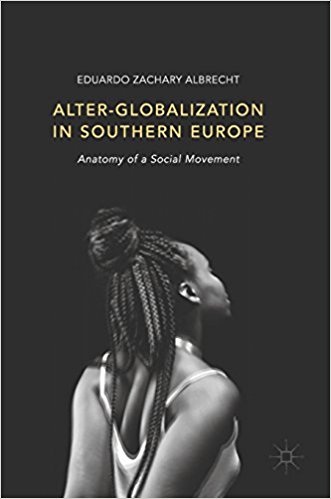In Alter-Globalization in Southern Europe: Anatomy of a Social Movement, Eduardo Zachary Albrecht explores the alter-globalisation movements in Spain, Italy and Greece that envisage resistance less as political protest in the pursuit of power than as a way of life. While this is a vivid account, it leaves deeper issues surrounding class identity unexamined and the question of the capacity for political change very much open, finds Benjamin Law.
Alter-Globalization in Southern Europe: Anatomy of a Social Movement. Eduardo Zachary Albrecht. Palgrave. 2017.
In Alter-Globalization in Southern Europe: Anatomy of a Social Movement, Eduardo Zachary Albrecht combines wide-ranging theoretical research with first-hand interviews to provide deep insight into the alter-globalisation movements in Spain, Italy and Greece. Across five chapters, he discusses topics such as protest and power; movements in Barcelona, Athens and Naples; the music scene and politics; and a ternary model of resistance. By doing so, he paints a vivid picture of a new field of study and asks potent questions about the relationship between dissent and power.
In the last decade, Southern Europe has experienced a wave of unrest and anger as a result of the downturn of globalisation in the wake of the financial crisis. The rise of different political movements and parties has been an integral part of this, from the anti-austerity protests in Greece to Indignados in Spain, from Syriza to Podemos. Each movement or party has positioned itself as the voice of dissent against the state, neoliberalism, austerity or a perceived establishment, and also seeks political power to overturn injustice.
Yet it is precisely this juxtaposition of protest and the pursuit of power that Albrecht takes issue with. He focuses on the alter-globalisation movement, which does not seek parliamentary seats or government positions but instead ‘operates within an apolitical social milieu’. He explains how the movements can have myriad political aims, carving out a space for themselves outside the political field while pushing for social change. They are not as radical as their political counterparts. Their aim is neither to overturn the current political system nor replace it with another, but to change the relationship between the individual and society. In other words, lifestyle choices and identity are at the forefront of their struggle rather than barricades, parliaments or picket lines.
Albrecht illustrates how resistance becomes ‘a way of life’ rather than a political protest. One of the movements used by Albrecht as an example is the alter-globalisation activist scene on the streets of Athens, a city where the conflict between power and protest has been experienced more sharply than other areas of Southern Europe. The activists are unanimous: the pursuit of power adds a trace of suspicion and inauthenticity to their struggle. The activists instead seek to rewrite what resistance means by creating a cultural scene outside of politics. Albrecht gives a detailed view of how they carve out their own space in the city by occupying neighbourhoods or creating alternative music scenes. Consequently, one is left with a vivid picture of the kind of counter-Kulturkämpf the activists are waging, and in each chapter Albrecht makes a believable case for the authenticity and sincerity of their activism.
 Image Credit: Graffiti, Athens, 2012 (Metro Centric CC BY 2.0)
Image Credit: Graffiti, Athens, 2012 (Metro Centric CC BY 2.0)
However, the question remains: if they have a political motive, how can they push for change even though they do not pursue power? The movement’s activists candidly explain their belief that by choosing an alternative lifestyle, they can change things at the lowest level: on the streets. As one of Albrecht’s interviewees exclaims:
I am a teacher and an activist in my classes. It is more about the long term. Change cannot happen at once, I wish it could, but I guess that is not how it works.
The activists, while instigating a cultural revolution, do not lose sight of the fact that this will be a long-term project and do not seem to lose faith due to this. This is very much a long march, if not through institutions of power then through cities.
One might be tempted to identify a whiff of the counter-hegemonic activism proposed by Antonio Gramsci. However, we should not fall into the trap of thinking that what the activists are proposing is the traditional aim of leftist movements: the eradication of class distinctions. The alter-globalisation movement, the author argues, does not operate as a vehicle for inter-class solidarity. Even with its aim of creating a counter-culture, Albrecht is quick to point out that ‘the movement actually draws most of its adherents not from the working class but from an increasingly disorientated middle and lower middle class’.
Albrecht is right to highlight the overwhelmingly ‘middle-class’ composition of the movement. However, he comes unstuck when he asserts that “activists are also found to be strongly averse to assuming any fixed class’, and reduces the experiences of other social groups inhabiting the urban areas that he and the activists encounter to ‘lifestyles’. If the alter-globalisation movement truly operates over and above traditional class labels, then Albrecht still has the problem of explaining why many of the activists’ assumptions of other members of the movement or urban inhabitants are riddled with class-based prejudices. So while Albrecht might be right to claim that the activists can act ‘revolutionary while assuring that their middle class privileges remain intact’, one gets the sense that any common solidarity with other social groups left behind by globalisation is seriously lacking and, by extension, any potential for the activists to form into a larger mass movement. The impression is left of a movement that is keen not only to define itself as unique, but also comfortably seclude itself from any outsider groups and within a constricted cultural space.
Albrecht does dedicate a chapter to the alter-globalisation movement’s stereotyping of other groups in Barcelona, Naples and Athens. He argues that the activists’ perceptions of other subgroups are based on cultural identity. Yet, the influence of class intersects their perceptions too sharply to be ignored. Among the social groups discussed by Albrecht as being perceived by the alter-globalisation activists as different are the Pestoni (translated as ‘beaten up’ or ‘tick’ in the book) and the Perroflautas (described as the ‘vagabonds’ with dogs begging for money). They are perceived and defined by how they dress: in essence by their choice of ‘lifestyle’, but this too is determined by socio-economic background.
The Neapolitan activists who, in the author’s words, ‘are conventionally associated with the defence of exploited communities around the world’, are also quick to define which of Naples’s neighbourhoods are ugly or beautiful on assumptions very much based on a middle-class/working-class divide. As Albrecht explains from a dinner party in an upper-class Neapolitan district he attended: ‘Lower class parts of the city were often described as ugly (quartieri brutti) while upper class areas were called pretty/good looking (quartieri belli).’ It is hard to ignore the class prejudices that are expressed by the alter-globalisation activists and yet further discussion in this direction is missing. This would have been very much worthwhile since Albrecht observes that the alter-globalisation activists in the three cities have the tendency to dismiss class as being a focus of political struggle.
At the end of his book, Albrecht wraps up his case with a few problematic conclusions. First, he hints that stereotyping other groups can be an authentic way of perceiving them. The alter-globalisation movement freely adapts and rearranges different cultural perceptions, creates a sense of uniqueness and thereby differentiates itself from other groups. In other words, identity and stereotyping are concepts to which the alter-globalisation movement gives its own meaning. Albrecht argues that by creating new stereotypes, the alter-globalisation activists ‘generate new ways of perceiving the social and political spheres’. However, he presses on with his most troubling conclusion when talking about the way the alter-globalisation activists ‘use the utopian stereotypes of alternativity, authenticity, and alternity’ to ‘open new spaces for themselves’: ‘This process may just as well be hypocritical, arrogant, or fetishize a faraway or nearby other – it is not important whether one’s narrative be politically congruous or even morally sound.’
He ends by asserting that stereotyping only needs to make sense from the activist’s point of view. This idea that authenticity is in the eye of the beholder is troubling in a so-called ‘post-truth’ age. Movements such as the Alt-Right stereotype other groups – be they Muslims or the Left – and create an identity based on their own highly subjective perceptions. If authenticity is subjective, then we have no criteria with which to refute the claims of fringe groups, no matter how odious or far-fetched.
He also contrasts the alter-globalisation movements with the counter-culture of the 1960s and 1970s, which was convinced that micro lifestyle choices could lead to macro societal and political gains. This would need a lot more discussion in order to be fully credible. Many counter-cultural movements made an impact by becoming political or morphing into political movements, the German green movement being a case in point. Despite Albrecht’s colourful account of the alter-globalisation movement and its anti-political protests, in the end the reader is still wondering about the potential for real political change and Albrecht leaves the question about the relation between protest and power very much open.
______
Note: this review was published on LSE Review of Books.
About the reviewer
Benjamin Law studied both in the UK and Germany and holds a BA in Philosophy and History and an MA in History. In the past few years he has worked for an NGO, supporting the German education sector. Additionally, he has worked as an editor and translator on an array of academic texts and journals. He currently lives in the UK where he continues to work in the education sector and as a part-time editor and translator.
All articles posted on this blog give the views of the author(s), and not the position of LSE British Politics and Policy, nor of the London School of Economics and Political Science.


 Find this book:
Find this book: 



